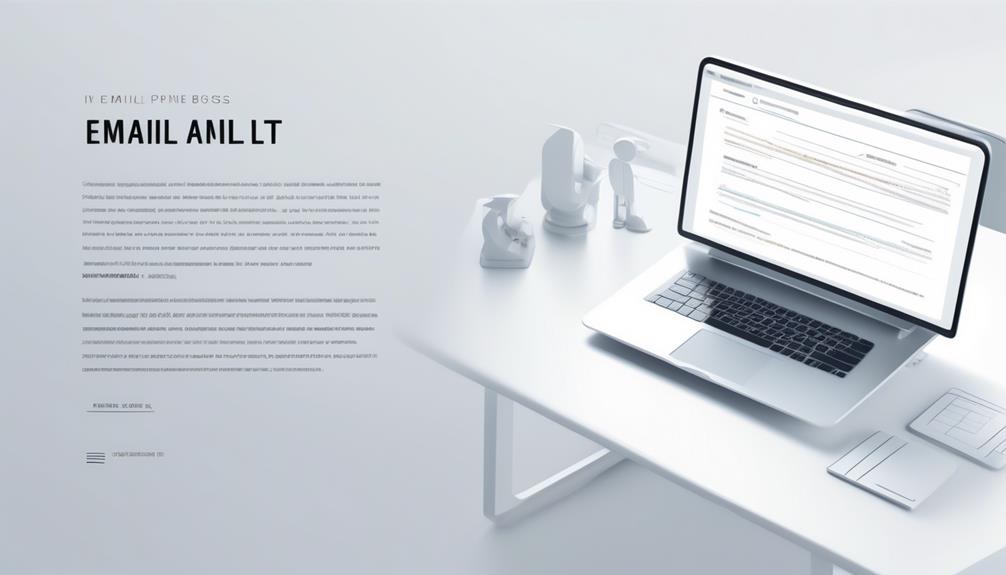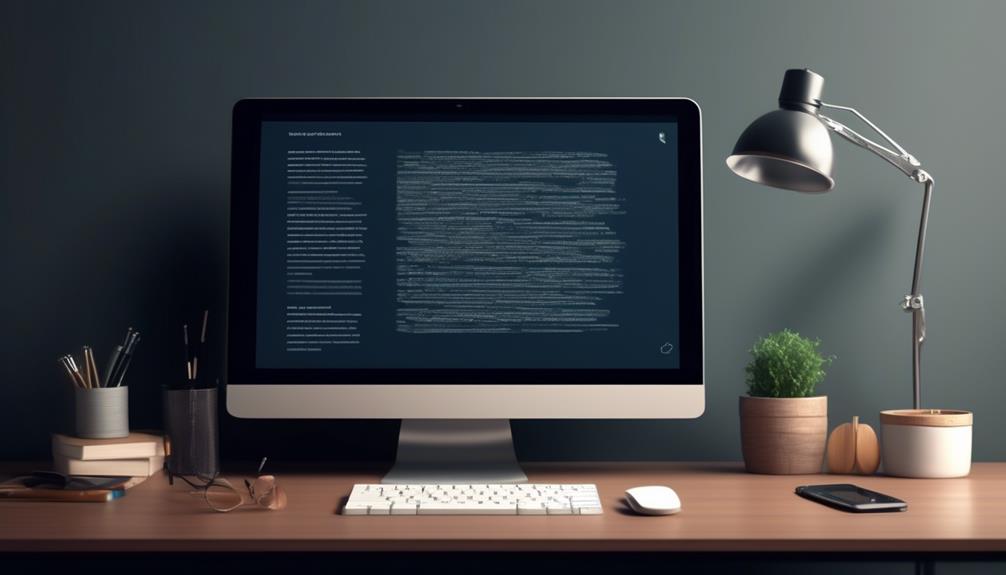Tackling the challenge of discussing issues with our supervisors is akin to delicately balancing on a tightrope – a single wrong step could precipitate a tumble. Our goal is to keep a constructive and fruitful rapport with those above us, yet occasionally, voicing concerns is essential for the welfare of both the team and the broader company.
In this discussion, we'll explore the art of composing an email that effectively communicates our worries while maintaining professionalism and respect. It's crucial to strike the right balance between expressing our concerns and showing our dedication to finding a solution, and we'll delve into the strategies for achieving this delicate equilibrium.
Key Takeaways
- Clearly articulate the problem and its impact on work or the team.
- Use a clear and concise subject line that summarizes the main issue.
- Offer potential solutions to demonstrate commitment to resolving the issue.
- Maintain a professional tone throughout the email.
Key Elements of a Concern Email
We must clearly articulate the problem and its impact on work or the team when composing a concern email to our boss.
The subject of the email should be clear and concise, summarizing the main issue at hand.
It's crucial to maintain a professional tone throughout the email, ensuring that the language used is respectful and appropriate for communication with our boss.
When writing the email, we should discuss the problem in a clear and objective manner, providing supporting evidence such as data or screenshots to substantiate our claims.
Additionally, it's important to offer potential solutions to demonstrate our commitment to resolving the issue. This shows proactive thinking and a willingness to contribute to problem-solving within the team or work environment.
Keeping the email concise and to the point is essential, as our boss likely has a busy schedule and may not have time to read lengthy messages.
Crafting a Clear Subject Line

Crafting a clear subject line is essential when composing an email to our boss about concerns, as it serves as the initial point of engagement and sets the tone for the communication.
To craft an effective email, the subject line should be clear and concise, accurately summarizing the content of the email. It should incorporate keywords relevant to the main topic or purpose of the email, avoiding vague or generic subject lines that may not effectively convey the urgency or importance of the email.
A professional email to the boss requires a clear subject line that prompts a quick response or conveys the intended outcome using action-oriented language.
When writing an email to discuss the issues, it's crucial to ensure that the subject line is relevant to the recipient and provides a clear indication of the email's content. By using a clear subject line, it becomes easier to ask your boss about a problem, as it sets the stage for a focused and productive conversation.
Therefore, focusing on a clear subject line is vital when crafting an email to address concerns with our boss.
Structuring a Respectful Salutation
When addressing concerns in an email to your boss, initiating respectful salutations with appropriate titles and the recipient's name sets a professional tone for the communication. It is essential to consider the organizational culture and your relationship with your boss when structuring the salutation. Below is a table outlining examples of respectful salutations based on different scenarios:
| Professional Relationship | Appropriate Salutation |
|---|---|
| Formal Setting | Dear [Boss's Title] [Boss's Last Name], |
| Informal Setting | Hello [Boss's First Name], |
| Gender-Neutral | Good morning/afternoon, [Boss's First Name], |
Crafting a respectful salutation demonstrates your professionalism and regard for the recipient. It is important to maintain a balance between being too formal and overly familiar, ensuring that the salutation aligns with your workplace norms and the nature of your communication. Ending the salutation with a formal closing, such as 'Sincerely' or 'Best regards,' followed by your name, further emphasizes your professionalism. Mastering the art of respectful salutations in emails contributes to building and maintaining a positive relationship with your boss.
Articulating Work-Related Concerns

In addressing work-related concerns via email, maintaining a respectful salutation sets a professional tone for the communication.
Now I'll pivot to articulating these concerns with clarity and professionalism. When articulating work-related concerns to your boss, it's crucial to:
- Articulate your thoughts clearly: Clearly and concisely explain the specific issue or concern you're facing. Providing relevant examples or evidence can help your boss understand the situation more effectively.
- Offer possible solutions: It's essential to demonstrate your commitment to finding a resolution by proposing potential solutions. This shows that you're proactive and willing to contribute to problem-solving.
- Keep the email professional and personal: While maintaining a professional tone, it's also important to express how the issue is impacting you personally. Balancing professionalism with a personal touch can help your boss understand the significance of the matter.
When emailing your boss about concerns, make sure the purpose of the message is evident from the subject line. Please let me know if there are specific guidelines for communication in your workplace.
These tips for writing a constructive email are aimed at fostering effective communication and addressing work-related issues promptly. I wanted to let you know that I appreciate your guidance in this matter.
Closing Professionally
How can we effectively conclude an email to our boss about concerns while leaving a positive impression and expressing gratitude for their time and consideration?
When closing the email, it's essential to be concise and to the point. We should use a professional sign-off to leave a positive impression and express gratitude for our boss's time and consideration.
It's important to end on a positive and optimistic note, offering to provide progress reports or updates if necessary. We can let our boss know that we're open to discussing the content of our email further and that we're willing to arrange a meeting to discuss possible solutions in more detail.
If we need to send a follow-up email to arrange a meeting or discuss the matter further, we should do so promptly.
In closing professionally, we can also express our appreciation for the opportunity to work from home and the support provided, and express our commitment to finding the best possible solutions.
Frequently Asked Questions
How Do You Write a Professional Email About an Issue?
We write a professional email about an issue by clearly stating the problem.
We provide any relevant background information.
We propose potential solutions.
It's important to maintain a respectful and professional tone.
We should be concise and to the point.
We should also consider the timing and urgency of the issue.
We ensure that our email is well-structured and free from any emotional language.
A clear and respectful approach can help in effectively addressing the concern.
How Do You Write a Concern Email to Your Boss?
When addressing concerns with your boss, it's important to be clear and respectful. Start by explaining the issue in a concise and professional manner.
Offer potential solutions and express a willingness to discuss the matter further. Keep the tone positive and focused on finding a resolution.
It's essential to maintain open communication and demonstrate a proactive approach to problem-solving.
Remember to proofread the email before sending to ensure clarity and professionalism.
How Do I Express My Concern to My Boss?
We understand the importance of expressing concerns to our boss. It's crucial to approach the situation with professionalism and respect. Evidence-based communication is key.
Did you know that 85% of employees believe that open and honest communication is essential in the workplace? We should aim to provide clear examples and propose solutions. Our commitment to finding a resolution will demonstrate our dedication to addressing the issue effectively.
How Do You Express Concern in an Email?
We express concern in an email by clearly stating the issue's impact, providing evidence, and offering solutions. It's important to maintain a professional tone, keep the email concise, and use a clear subject line.
Conclusion
In conclusion, addressing concerns with your boss via email is like navigating through a maze – it requires careful planning and clear communication. By including key elements, crafting a clear subject line, structuring a respectful salutation, and articulating work-related concerns, you can effectively convey your message and work towards finding a resolution.
Remember to remain professional and offer possible solutions to demonstrate your commitment to addressing the issue.









